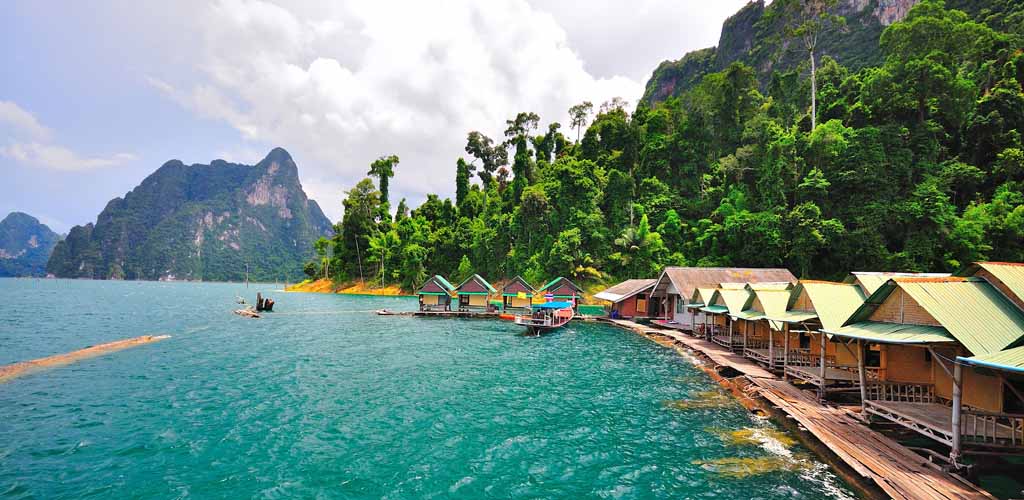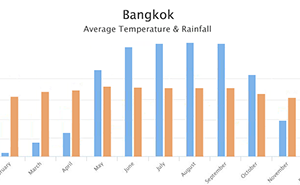Thailand Travel Notes
Thailand is comfortable yet exotic, traditional but modern, a destination as exciting as any in Asia. While it’s grown in popularity and no longer sounds as adventurous as it once was, the tradeoff comes from its dazzling appeal: palm-fringed white beaches, spiritual culture, fabulous cuisine, and all the conveniences of contemporary luxury travel.
The Land of Smiles provides easy going travel. This manual contains an overview of important information for anyone planning luxury Thailand travel. It’s not intended to be comprehensive as all our guests receive a more detailed pre-departure pack before they travel.
Thailand Trip Planning
NEED TO KNOW
- Thailand is one of the most popular and modern destinations in the Asia.
- Finer hotels can fill up to a year in advance of high season
- Thailand is an attractive choice for first-time travelers to Asia
AIRLINES
Contact us for quotes and suggested routing and carriers. We also organize
TRIP COST
Private trips from US$500/day
THAILAND CLIMATE (When to go)
Best Months :April,May,September
Morderate :March,June,October,November
Adverse : Late June,July,August,December
BOOK TO PACK
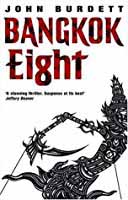 Bangkok 8 and Bangkok Tattoo, both of these John Burdett detective thrillers are pulpy, but engaging and very Thai. Four Reigns, by Kukrit Pramoj is the best in history books.
Bangkok 8 and Bangkok Tattoo, both of these John Burdett detective thrillers are pulpy, but engaging and very Thai. Four Reigns, by Kukrit Pramoj is the best in history books.
TRAVEL INSURANCE
- Japan is the most expensive travel destination in the world.
- Finer hotels can fill up to a year in advance
BEFORE YOU GO
Our comprehensive pre-tour cover every detail of your trip and travel in japan.
Top Thailand Travel Tip
If you've longer than a week, Thailand should be combined with another destination, such as Angkor or north Vietnam. Think of Southeast Asia like Western Europe, a mix of fascinating, unique cultures and attractions all within a compact geographical area.
Thailand Trip Planning
When to Go
- Thailand's climate is hot and humid, and though suitable at any time of year, there are distinctions between the seasons.
- November to February is coolest and driest, widely regarded as the best time to travel. It's peak tourist season, so we like to recommend lesser-developed destinations and hidden resorts.
- March to May is hot and it's good to include a getaway into the hills, a few days in the north giving you a break from the sweaty days.
- June to August is warm, the sunny days punctuated by brief, heavy showers. It's a good time to travel but note the extended rainfall around the Andaman Sea, including the islands in and around Phuket.
- September and October is the height of the wet season and rain becomes a regular feature in any itinerary. On the plus side, the country is quiet with very few tourists.
Important Dates to Consider
- Christmas and New Year is incredibly popular, with both Western and Asian travelers. Hotels and resorts are booked out months in advance and you really need to plan ahead for travel during this time.
- Songkran, the energetic Thai New Year's festival is celebrated from 13 th to 15 th April each year. The Buddhist festival is famously characterized by throwing water but is also highly spiritual. We know some great local experiences for those wanting an immersion in the festivities. Again, book well ahead for this time of year.
- The beautiful Chiang Mai flower festival is held on the first weekend in Februar.
- Equally enchanting, Chiang Mai's famous Yi Peng Lantern Festival usually takes place in the first week of November, coinciding with Loy Krathong. Note that the mass release of sky lanterns is actually in Mae Jo, 30 minutes from Chiang Mai, with the date decided only a few months in advance.
Where to Stay
Thailand's accommodation is one of its highlights. You'll find contemporary luxury all over the country, from vintage city hotels to jungle and beach retreats hidden from the world. This Western quality is enhanced by traditional Thai hospitality, such friendly welcomes offered everywhere you stay. While Thai tourism has mushroomed in recent years, it's easy to escape the crowds at boutique resorts, where private beaches are enclosed by rugged cliffs and swaying palms. In the cities, this rise in tourism has contributed to a rise in standards, with Thailand now offering some of the best accommodation in Asia.
Traveling to Thailand
- Bangkok is the standard starting point for most private Thailand tours, with an array of direct connections to cities across Europe and the US. However, the international flight network is expanding and there are increasingly more options for those wishing to skip the Thai capital.
Traveling Around Thailand
- Much of Thailand's tourism growth has been stimulated by the growing network of domestic flights. Getting around is incredibly efficient now, with flights hopping to remote islands and what were once mostly inaccessible interior destinations. It's made travel quick, opening up so many options for ambitious itineraries. Flying isn't the only way. In the north of Thailand, infrastructure developments have led to beautiful road journeys, particularly the stretch from Chiang Mai to Chiang Rai. In the south, yacht charters enable you to visit completely deserted islands. Also consider the train, a languid journey from Bangkok to Chiang Mai in the north.
Visa Requirements
- Most travelers do not require a visa to visit Thailand, including those carrying passports from the US, Canada, UK or EU countries. Visitors are given a visa-free 30-day stay in the country upon arrival.
Health and Safety
- Thailand is a very safe country and crime against tourists is rare. While there are some (fairly famous) scams, our local guides ensure you're not taken in. As the country has blossomed it's become an extremely pleasant place to travel, in spite of any political upheaval that's been taking place. In general, changes within the monarchy and government haven't effected the overarching feeling of safety.
This is also a very healthy country and anyone who spends a week enjoying its food will see why people live so long. Healthcare has improved drastically over the last two or three decades, with good hospitals found in the major cities. Note that Thailand remains rural and access to medical facilities can be limited on certain islands. Specific inoculations are rarely recommended, other than those typically required for travel anywhere. Thailand is malaria free.
Trip Costs
- Our private Thailand tours start from US$300 per person per day including transport, accommodation, private guided tours, and lots of extras.
Climate and When to Go
The Land of Smiles is mostly hot and humid. This is a country where climate really dictates the best time to visit. However, these peak months can be crowded and for those traveling out of season we know some excellent lesser-known destinations.
November to February
This is the best time to visit Thailand, the days being cooler and less humid days, the chance of rain close to zero. From November to February you can enjoy all of Thailand’s pleasures, with the islands coming into their peak season. While it can be busy, we know the retreats to keep you away from the crowds.
March to May
It’s hot now, the temperatures ranging from 80ºF to 95ºF. It’s also humid, throughout the day and into the night. This heat isn’t a problem when you’re on the islands, with the cooling turquoise waters so close by. Nor in the mountainous north, where the elevation helps keep the mercury a little lower. Bangkok and the Central Plains can be tough though as this is the hottest time of year.
June to August
The Thais love June, July and August, since the weather is typically fine, but punctuated by the odd dramatic storm. The weather pattern are brief, heavy showers, but with plenty of sunshine between showers. Temperatures range between 70ºF and 90ºF.
September to October
The wet season in Thailand. A consolation for travelers during this period is beaches, restaurants and streets are uncrowded. Even at this time, there are still long intervals of sunshine between the heavy rainfalls.
Weather Contrasts on the Thai Islands
For travel to the Thai islands, there are climatic differences between the Andman Sea (Phuket-area) and the Gulf of Thailand (Samui-area).
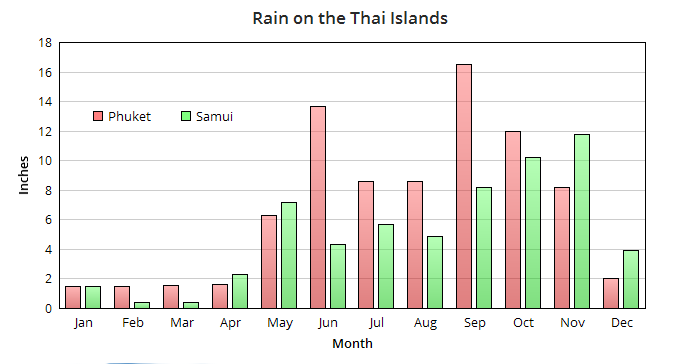
Pre Departure Planning
Visas and Entry Requirements
No advance visas are required for citizens of the USA, Canada, UK and other EU countries. Upon arrival, visitors of these nations are provided 30 days visa-free travel in the Kingdom of Thailand. Note that your passport must be valid for six months after the end date of your trip; please check your passport is indeed valid for this amount of time.
Cancellation, Delay and Travel Insurance
We recommend that all travelers purchase some form of trip cancellation and delay insurance. It’s not uncommon for travelers to cancel or have their trip delayed for the most unexpected of reasons. Such insurance will likely include additional medical coverage and for lost or delayed baggage. Indochina Travel has a long-time partnership with CSA Travel Protection, one of the major insurance companies. They would be happy to provide you with a quote.
Luggage
Thailand’s regional and domestic airlines restrict luggage to one piece with a weight of no more than 20 Kilograms (44 pounds) per person. Your passport, travel documents, jewelry, money, camera, fragile items and any medication should be hand-carried and not checked in.
On domestic flights, each passenger is allowed one piece of hand luggage. When planning your packing, please bear in mind on your trip may be constantly on the go, staying in a new hotel at least every other day. You'll want to pack lightly for mobility and convenience as well as have a day pack for daily tours. Checked luggage is required by the local authorities to be at the airport two hours prior to your flight departure. If we are arranging check-in for you, then we need to arrange collection of all bags before your departure in order to complete all check in formalities for you.
What to Pack
Light, cotton (not polyester) clothing is adequate for most of Thailand. The country is hot all year and it’s rare you need any warmer clothing, other than visiting destinations at altitude in the north of Thailand. Revealing clothing is not welcome in this conservative and largely Buddhist region. The exception is on the beach, where bikinis and swimming shorts are accepted but topless sunbathing is not. Note that it’s important to respect conservative culture when traveling off the beach and into the towns, by covering up appropriately, even when just a few meters from the sand.
When visiting religious shrines and temples, modest dress is required and easily removable footwear is recommended, since such sacred grounds must be visited only in bare feet (no socks). A sarong is handy for covering up before entering religious sites, such as temples.
Landing in Thailand
Bangkok Arrival Procedures
Before travel, you will be given the 24-hour contact information of our Thailand country manager, along with contact details for guides and other representatives assisting on your trip.
We can organize a range of services for your arrival in Bangkok:
- Fastrack Immigration. Upon exiting aircraft, an agent will escort you through expedited immigration.
- Private Car or Helicopter Transfer to Hotel: Upon exiting the aircraft, an agent will escort you and your bags from the arrival gate, through expedited immigration with your luggage delivered and portaged to your car.
- Intra-Terminal Airport Escort: Upon exiting aircraft, an agent will escort you and your bags from the arrival gate, with transport through the airport to your connecting flight.
- Airport Lounge or Short Stay: Airport lounge services reserved for you and your party.
- Airport Hotel: Accommodation at the Novotel Airport hotel, located 300 yards from the main terminal. A hotel shuttle bus operates every 10-15 minutes.
- Private Car Transfer (without Fast Track service): After immigration and custom procedures, exit terminal at gate six to meet your car and driver who will be holding a placard with your name.
Money Matters
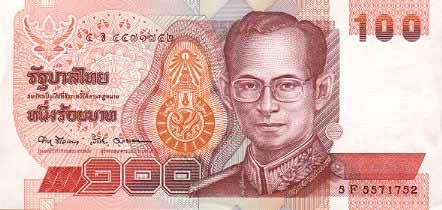
ATMs are everywhere in Thailand, including inside the ubiquitous 7-11 stores. You may load up on Baht (the official currency) at the airport right after arrival. Unlike other countries in Indochina, U.S. dollars are not widely accepted in Thailand. Credit cards (except AMEX, which is rarely accepted in Asia) may be used almost everywhere, and definitely at high-end establishments.
The Thais, as many Asians do, like to bargain. Guides can assist you at markets and street stalls, helping you get a better price. There are also Western-oriented tourist shops and malls where prices are set and marked. The bargaining in Thailand is typically good natured, reasonable, and comes with a friendly smile.
Tipping
A rough estimate for tipping is $25-50 per day for your Thai guide, based on a couple or family. Estimate around half that amount for your driver. For portage and other services we suggest 60-150 Baht, which is in the $2-5 range.
Tipping is not expected in restaurants, where a service charge is typically included in the bill. At informal, street cafes a small tip is appreciated. An appropriate tip for hotel porters and other service providers is $1-2. Cleaning staff could be about $2 a day, left at the end of your stay on the nightstand, where it's easily visible.
Staying Connected
Wi-Fi is now ubiquitous in Thailand. In particular, it’s easily found in regional hotels, restaurants and cafes. More remote areas in Thailand may have reduced speeds, but the connection is still reliable.
Your mobile phone, regardless of carrier, should work fine with Thailand's modern and extensive 2G, 3G and 4G mobile networks. Coverage is excellent in cities and good in remote areas. Activate your roaming plan before you arrive in Thailand. You will also have your Thai guide's telephone number in addition to your local tour manager's before arrival, which you may pass on to anyone who may need to reach you. Guides can also assist you in purchasing a local Thai sim card, good for those who intend to do a lot of mobile roaming.
Electrical

Electricity in Thailand is typically 220-volt, although 110 volts can found as well. Modern appliances, like your iPad, Kindle, mobile phone, digital camera, laptop adapter, etc. will automatically adjust the higher voltage without any issue. As a rule, devices and gadgets with motors (and no adapter), such as hairdryers, are prone to break.
Electric power sockets come in varieties, including the common and clever round two-prong with dual US-style outlets. This is found at most luxury and boutique hotels, so you will not need to depend on any outlet adapters. Please note sporadic power outages are common, especially in remote areas, although high-end resorts and restaurants have generators as back up.
Giving Back
No doubt you will be moved by the wonderful people you meet along the way, including some who live in poverty. It may be hard not to feel compelled to give something, but thinking about doing so will change the dynamic. We recommend pens, simple to carry with you, useful and beyond the budget of many families. We never encourage giving money, candy or the like. For giving before or after your trip, we can recommend a number of charities doing excellent work in Thailand.
Language
Thai is a beautiful language, both in the written and verbal form. It rolls off the tongue, the intonation making every sentence sound a little like music. This is a very challenging language to learn, although you should quickly pick up a few basics. Simply saying hello and thank you in Thai will quickly endear you to the locals, whether in a remote market or city restaurant. Our guides can show you the basics along with some more complex phrases.
English is widely spoken in all major Thailand tourist locations. You’ll definitely find English-speaking staff in the top hotels and attractions. However, English is spoke significantly less in the rural areas, particularly in the north of the country. Much of the signage is is Thai only, so it’s always good to have a guide helping you out. Other languages spoken in Thailand are Chinese, Lao, Malay and Mon-Khmer, while English use is becoming more prevalent in government and commerce. And when you visit hill tribes you discover that there are a dozen more languages in Thailand.
Health and Medical
Health requirements in the region are subject change with only short notice and we recommend you also check with your medical professional and other up-to-date resources, such as the Centers for Disease Control.
In general, Thailand has good medical services in urban areas. This includes hospitals, health clinics and pharmaceutical services. However, coverage in remote destinations can be limited, particularly on the smaller islands. Ensure you have adequate health and travel insurance to cover any treatment required.
Emergency
In an emergency, we may attempt to contact doctors at the International SOS in Thailand. If necessary, you may be transported to the nearest medical facility for treatment. An air ambulance jet may also evacuate you to Bangkok or Singapore, if necessary. This evacuation service is provided through SOS International (www.sosinternational.com), a long time emergency medical response outfit with offices and clinics throughout the region. We highly recommend you take out this insurance out through us for your trip rather than third parties like TravelGuard.
After arrival at a clinic or hospital, Indochina Travel cannot be responsible for medical treatment decisions on your behalf. In addition, Indochina Travel assumes no responsibility whatsoever for any emergency medical or evacuation or services ultimately provided.
Vaccination Information
In general, Thailand is free of contagious disease. However, travelers should ensure they are up-to-date with the usual schedule of recommended vaccinations. This encompasses coverage against diseases such as Tetanus and Diphtheria, Measles, Mumps and Rubella, along with protection from food and water-borne diseases such as Typhoid and Hepatitis A.
When travelling to rural Thailand or staying for more than two weeks, Hepatitis B and Rabies may also be recommended by your medical professional. Malaria has mostly disappeared from Thailand and does not typically occur in places you are likely to travel to.
Safety
Despite the region's history and an undeserved modern reputation, Thailand is amongst the safest places in the world to travel. Physical crime against travelers is extremely rare. When traveling with Indochina Travel, you can entrust your possessions and valuables to the guides and drivers. When exploring on your own, please leave your valuables and travel documentation in your hotel safe.
Although crime is rare, Thailand is legendary for confidence and other scams, from innocent offers to visit a relative's tailoring shop to sophisticated gem fraud. In fact, some scams are so common they have their own colorful names such as the "Jet Ski Scam," the "Sombondee Seafood Market Scam" and "Lamphong Train Station Scam." Be especially wary of tailoring and gem offers. If you’re looking for gems and suits, we will send a list of reputable vendors with your pre-trip packet.
Thailand has been a top traveler destination for centuries. With a robust and high-quality tourist infrastructure, travel is efficient and reliable. Our past travelers always cite how warm and friendly the people are. Almost all guests on our private Thailand tours have been struck by how tranquil the country is. We'd be happy to put you in contact with our past travelers for their impressions of their Thailand trips.
